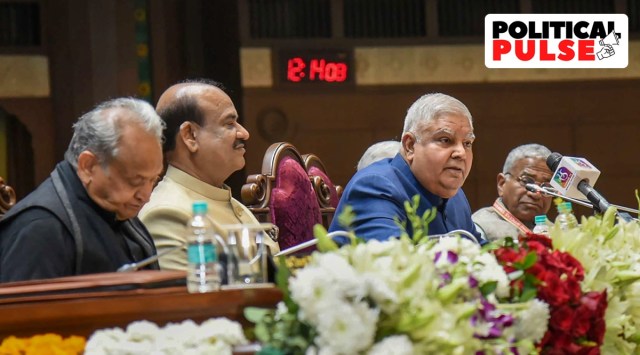Basic of any basic structure is… sovereignty of Parliament… Can’t subscribe to SC (order): V-P Dhankhar
Vice-President Jagdeep Dhankhar's Jaipur speech was the third time in just over a month that Dhankhar took on the Judiciary over balance of powers, especially related to appointment of judges
 Vice President Jagdeep Dhankhar with Lok Sabha Speaker Om Birla, Rajasthan Chief Minister Ashok Gehlot and Rajya Sabha Dy. Chairman HN Singh at the 83rd All India Presiding Officers' Conference in Jaipur. (PTI)
Vice President Jagdeep Dhankhar with Lok Sabha Speaker Om Birla, Rajasthan Chief Minister Ashok Gehlot and Rajya Sabha Dy. Chairman HN Singh at the 83rd All India Presiding Officers' Conference in Jaipur. (PTI) Giving the inaugural address at the 83rd All-India Presiding Officers’ Conference in Jaipur Wednesday, Vice-President Jagdeep Dhankhar questioned the Supreme Court’s landmark 1973 judgment in the Kesavananda Bharati case, which laid down that Parliament cannot change the basic structure of the Constitution.
Since he became the Vice-President, Dhankhar has been raising questions over the balance of power between the Executive and the Judiciary, particularly over appointment of judges.
In his Jaipur speech, Dhankhar said: “In a democratic society, the basic of any basic structure is supremacy of the people, sovereignty of the people, sovereignty of Parliament. Executive thrives on the sovereignty of Parliament. Legislatures and Parliament decide who will be the Chief Minister, who will be the Prime Minister. The ultimate power is with the Legislature. The Legislature decides who will be in other institutions. In such a situation, all Constitutional institutions – the Legislative, Executive, Parliament – are required to be within their limits,” he said.
He then went on to talk about the Kesavananda Bharati case. “In 1973, in the Kesavananda Bharati case, the Supreme Court gave the idea of basic structure saying that Parliament can amend the Constitution, but not its basic structure. With due respect to the Judiciary, I cannot subscribe to this,” Dhankhar said.
Referring to the relationship between the Judiciary and Legislature, one of the topics of discussion, Dhankhar said: “We cannot have an ostrich-like stance… Parliamentary sovereignty and autonomy cannot be permitted to be qualified or compromised as it is quintessential to the survival of democracy… The more subtle the incursion, the more dangerous it is.”
The Legislature, he said, did not have the power to write judicial orders, and the Executive and Judiciary did not have the authority to legislate. He cautioned against “one-upmanship” and “public posturing from judicial platforms” which, he said, was prevalent today. “This is not right.”
In a reference to the Supreme Court striking down the NJAC (National Judicial Appointments Commission) Act, Dhankhar said: “This (the Act) is not a challenge to the Judiciary, this is believing in the Constitution. This is believing in democracy.” The NJAC Act gave the government a role in the appointment of judges, but the Court struck it down to retain sole rights to pick the same via the Collegium route.
Dhankhar asked how the Executive could bow down before the Supreme Court decision when the Act had been passed by Parliament, ratified by 16 Assemblies and signed by the President.
In an apparent reference to the Supreme Court asking the Attorney General to advise government functionaries to exercise control in their comments on the Collegium, Dhankhar said he did not entertain the A-G on the issue. “I cannot be party to emasculating the power of the Legislature,” he said.
On December 7, 2022, presiding over the Rajya Sabha for the first time, on the opening day of the Winter Session of Parliament, Dhankhar called the striking down of the NJAC by the Supreme Court a “severe compromise” of parliamentary sovereignty and disregard of the “mandate of the people”.
Dhankhar said that Parliament, being the custodian of “the ordainment of the people”, was duty-bound to “address the issue” and expressed confidence that “it will do so”.
Speaking on the power of Parliament to amend any provision of the Constitution in accordance with procedure, the Vice-President said that this power was “unqualified and supreme, not amenable to Executive attention or Judicial intervention except for the purpose of deciding any case involving a substantial question of law as to interpretation of the Constitution envisaged in Article 145 (3) of the Constitution”.
Going on to talk about the NJAC as a “much-needed historic step”, he said: “Rarely in Parliamentary democracy, there has been such massive support for a Constitutional legislation.”
“Parliament is the exclusive and ultimate determinative of the architecture of the Constitution,” Dhankar added.
Days earlier, in an oblique reference to the striking down of the NJAC, Dhankhar, while sharing the dais with Chief Justice of India D Y Chandrachud, said it was “never too late to reflect”.
“The Indian Parliament, in 2015-2016, was dealing with a Constitutional amendment Act and, as a matter of record, the entire Lok Sabha voted unanimously. There was no abstention and no dissension. And the amendment was passed. In Rajya Sabha, it was unanimous, there was one abstention. We, the people – their ordainment was converted into a constitutional provision. The power of the people came to be reflected… on a legitimate platform through applicable mechanisms. That power was undone. The world does not know of any such instance.”
Dhankhar added: “If a Constitutional provision that carries the ordainment of people at large in such a vibrant democracy is undone, what will happen?… Interpretation of the Constitution when a substantial question of law is involved can be done by the court. Nowhere it says that a provision can be run down.”
Saying it was “never too late to reflect and think”, he said, “As a student of law, a modest student of law, can parliamentary sovereignty be ever compromised? Can a succeeding Parliament be bound by what has been done by an earlier Parliament?”





- 01
- 02
- 03
- 04
- 05


























